Despite my love for all things Wes Anderson (well, almost all things), I haven’t really been following the development of The Grand Budapest Hotel. That’s not down to a lack of interest; I simply didn’t expect that there would be much reason to follow it yet. Last I heard, just a few months ago, it sounded like the casting was still being finalized. Then, this past week, boom, a trailer:
Maybe it’s just me, but it felt a lot like this project went from “I have an idea” to “Here ya go, finished the movie while you weren’t looking” pretty quickly. I’m not complaining. I’m actually thrilled. It’s slated for a March release, and the trailer looks fantastic.
Anyway, since I analyzed the Moonrise Kingdom trailer what feels like only yesterday, I figured I’d do something similar here as well. Actually I hope you’ll do most of the work for me in the comments; unlike with Moonrise Kingdom, there aren’t any major themes that I feel confident picking out of the scenes on display here.
With the disclaimer that this article will therefore be terrible and worthless, let’s begin.
From the very first shot of the trailer, we know we’re squarely within Anderson territory. That’s absolutely his uniquely selective eye at work in the color, and it’s just hideously gorgeous. The starkness of the red, the flatness of the purple. It’s like minimalist art that only resolves itself into live action when somebody moves.
Ralph Fiennes and Tony Revolori seem to play the main characters in this film, and their relationship gets explained later on in the trailer. For now, we get some sketchy but familiar setup: a young man aspires to a position that seems to mean a lot more to him than it does to anyone else. In this case, it’s being a lobby boy at The Grand Budapest Hotel.
Fiennes, for what it’s worth, plays Gustave H., and Revolori plays Zero, which is about as on-the-nose as any Anderson name has ever been.
Zero is already wearing his lobby boy outfit, but we find out in a moment that he’s a “junior lobby boy in training.” It’s hard to imagine a more demeaning title, but something tells me Zero cherishes it.
If you somehow didn’t realize you were watching a Wes Anderson trailer before, you definitely will now. Our next shot is his signature “Eye of God” perspective, gazing fixedly down at the lobby of the Grand Budapest.
The music that kicks in here got me very excited, as it sounds a lot like the work of Mark Mothersbaugh. However it looks like Alexandre Desplat is actually composing this one again, and I should probably give up hope that Mothersbaugh will ever come back for a full score.
I’ve said it before and I’ll say it again: Anderson’s films lose so much without that man on the soundtrack. I’m positive it will be good, but I’m also positive that his absence will continue to be felt.
There’s a nice little montage of the carefully composed austerity of the Grand Budapest, and I don’t have much to say about it apart from the fact that it’s fantastic. I had a hard time choosing which snatch of footage to highlight here, but ultimately I chose this one because LOOK AT THAT PAINTING MY GOD THIS MOVIE.
The hotel setting is an important one to Anderson, for whatever reason. I was going to mention this in a later installment of Steve Zissou Saturdays (probably in April, 2034) but it’s kind of a running theme for him. It’s where the budding criminals hunker down in Bottle Rocket, it’s where Mr. Blume goes after his wife kicks him out in Rushmore, it’s where Royal Tenenbaum goes after his wife kicks him out in The Royal Tenenbaums, and it’s where Team Zissou goes to rescue their bond company stooge in The Life Aquatic With Steve Zissou. Then, of course, there was Hotel Chevalier, which was the supporting feature for The Darjeeling Limited.
Anderson finally basing one of his films around a hotel — at least in terms of its title and setup — feels more than natural; it’s inevitable.
Every shot in this trailer is blocked masterfully. I just wanted to say that.
This seems to be Gustave exchanging pleasantries with his lover, though I can’t be sure if he’s romancing several elderly women throughout the trailer, or if they’re all the same one that ends up dead. They all look alike to me because I’m a big ageist bastard.
Let’s take a moment, though, to just admire Gustave here. Because my goodness. The bow tie. The mustache. The tiny shirt buttons. The lapel pins. This is why I love Anderson’s movies. This image right here. You can pause just about anywhere, and sit back, and admire.
See what I mean?
We learn that Gustave’s lover was 84 years old, but was “dynamite in the sack.” We also learn of the romance, or at least infatuation, between Zero and Agatha, played by the gorgeous Saoirse Ronan. I can’t make out the book she’s reading here, and that disappoints me for reasons I’d be ashamed to discuss any further.
Zero’s hands on the carousel horse’s face are a perfect touch. It’s so wonderfully, vaguely inappropriate, and yet disarmingly innocent.
We then get a lovely shot of Agatha from Zero’s point of view, with the carnival lights blurred behind her. However we also see her birth-mark, which taken in tandem with the joke about Gustave having sex with an old woman is slightly worrying.
I say slightly and I stand by it, because I understand that trailers are edited to make these tiny comic moments seem larger than they are; I doubt Wes Anderson made a movie that coasts on the joke of flawed people fucking.
Still, though, it’s the kind of thing I’d worry about in somebody else’s hands…that we’d get a scene that degenerates into Austin Powers “Moley moley moley” territory.
A moment later, Gustave discourages Zero from pursuing his curiosity about the birth mark. I hope it’s a lesson he learns quickly.
That little dismissive finger gesture, by the way, is the moment that cemented for me that Ralph Fiennes belongs in a Wes Anderson film. Not that I had doubted it before…it’s just nice to see it confirmed so ultimately.
Zero, narrating, discusses his relationship with Gustave: Zero was to be his pupil, and Gustave was to be his counselor and guardian. The mentor-protege relationship is another career-long Anderson theme, and I wouldn’t be surprised if “surrogate father” is the unspoken third role Gustave takes on. The mere usage of the term guardian suggests that, but of course it could be meant in another sense, considering the violence we see later in the trailer.
Gustave is informed that the police wish to speak with him, and there’s a lovely, loaded silence before he agrees to see them. I love the quiet, blank expressiveness of Zero’s face, too.
I’m so excited to see this movie…probably even more excited than I was about Moonrise Kingdom. That movie was great, but it also felt warm and comforting. The Grand Budapest Hotel already feels kinetic and dangerous, and that’s going to be a very interesting contrast.
Anderson takes a moment to prove that the titles for Saddest Crime Scene Photo and Funniest Crime Scene Photo don’t have to be mutually exclusive.
We then get the single funniest moment of the trailer, in which Gustave calmly suggests that his lover’s been murdered and that he’s a suspect. He then turns on his heels and flees the police who are standing with their hands clasped harmlessly behind them.
This is gorgeous stuff. This is so perfect that if they decided to destroy all copies of the film tomorrow, I’d still be content to just rewatch the trailer endlessly. I don’t know if I’d ever be able to pull anything of substance from it, but I’d have a heck of a lot of fun trying.
Anyone want to turn this into an enormous print to hang on my wall? Christmas is coming…
Or maybe I was wrong; the “I want some” speech by Gustave here is just hilariously, awfully, sincerely perfect. It made me look up the screenwriting credits on this film, and it looks like it’s just Anderson himself.
I think this is the first film that he wrote alone, which is surprising. The sometimes “gaggy” nature of this trailer made me wonder which co-writer was bringing that to the mix. Turns out it’s just our man Wes himself. And I kind of love him more for that. I love that one of my favorite living artists is channeling his inner Fozzie Bear.
This is another moment I just needed to pause and appreciate. Look how impeccably composed this shot of Jeff Goldblum is. No element of this scene seems compatible with any other, and yet it’s so careful and deliberate. The rounded wall with the flat picture of the pig hanging on it. The candle sticks of different heights. A piano on the left and a stuffed bear on the right. I adore this.
We also learn that the dead lover is named Madame D. So I’ll just look up who plays her and…
…Tilda Swinton? Really? That was her? I honestly didn’t know that until this very moment. That’s some makeup job.
Madame D. leaves Gustave H. a painting called Boy With Apple. This seems to be an important element of the film, and it’s possibly what sets the entire plot in motion.
Also, note the mirror there. A later moment “mirrors” this one, with a magnifying glass.
Adrien Brody plays a man called Dmitri, but you’d never know it from his accent. I’m not complaining, but there you go.
He gets into a spat with Gustave H. that devolves into a slapsticky sequence of knock-outs. The Grand Budapest Hotel may turn out to be Anderson’s silliest film yet, but it feels so much like Anderson that I’m more thrilled by the possibility than wary of it. By all means, let the man make his comedy.
At the end of the sequence we get a chilling turn toward the camera from Willem Dafoe, which sort of complicates the humor of the sequence we just witnessed. Yes please.
There’s that magnifying glass. Agatha seems to be in danger, or could potentially be. It’s something to do with the whereabouts of Boy With Apple, so Zero gives her a note written in code that tells her where to find it.
She expresses some understandable reluctance to be dragged into the affair, and then we see Zero and Gustave replacing Boy With Apple with this:
Yep. This’ll be his silliest movie yet.
Some more fantastic blocking, and I especially love the way the policeman points in just such a way to the men on his right, and then shifts and points in exactly the same way to the men on his left.
And is there anything better than seeing people getting bossed around by a man they can only see from the chest up?
No. No there’s not.
We see Bill Murray shouting for someone to get into his vehicle and a few more shots of somebody on the run. No idea who is running, or why, or from whom, which leaves the manic second half of this trailer feeling a bit directionless. That’s not a problem, but it does make the trajectory of the plot feel a little unclear at this point. Unlike the relatively straight-forward Moonrise Kingdom, I think even the most obsessive fan would find it difficult to make any confident guesses about the direction this film will take.
We also see a group of prisoners tapping away at the bars on their window in unison, presumably to very gradually chisel through. The sillier it gets, the more I can’t wait for the movie to floor me, and very likely break my heart.
There’s a bunch of quick shots of the actors that hearkens back to the opening titles for The Royal Tenenbaums, and I almost wonder if we won’t get something similar at the start of this film. There are a lot of nice freeze frames here so by all means pause every one of them.
I just wanted to highlight the one above because we’re being promised that at some point we’ll see a shirtless Harvey Keitel covered in gang tattoos. If that doesn’t merit a special mention, I don’t know what does.
Oh, and this sequence reveals to me that the policeman in the floor is played by Edward Norton. YES.
Sorry, I promised analysis but I’m just gushing. So: Edward Norton played Scoutmaster Ward in Moonrise Kingdom and he was brilliant so YES.
“You can’t arrest him simply because he’s a bloody immigrant” is another of those great, backhanded lines that it seems like Gustave H. will be full of. There’s a surprisingly raw scene of physical battery that results in bloody noses for poor Gustave and his lobby boy, and then a lot of shots of…um…shots being fired.
There’s also Gustave in prison, Willem Dafoe angrily skiing, and Zero in disguise. I am more than a little happy that the trailer actually sees it fit to downplay the action, spending longer stretches on the dialogue, awkward pauses, and beautifully framed shots of doomed relationships. What should potentially be the most exciting thing in the film — the catalyst that brings all of this chaos raining down — is barely even alluded to.
Because that’s not as important as who these characters are. How they act. And what they see when they look in the mirror.
Well fucking done.
The trailer ends with a great scene of Gustave being dismissive and impatient while Zero tells him about his experience under torture. The punchline to the scene is also a lovely button on the trailer itself.
The interplay between these two characters — both of whom are played by newcomers to Anderson’s world — looks like it’s going to be some standout stuff. I genuinely cannot wait to see the finished product.
And so ends my analysis, devoid of analysis. With so little context I’m unable to dig very deep. But I am able to be primed absolutely for an unrivaled night out at he movies. And frankly, at the end of the day, that’s what I’d prefer.
Roll on March 2014.
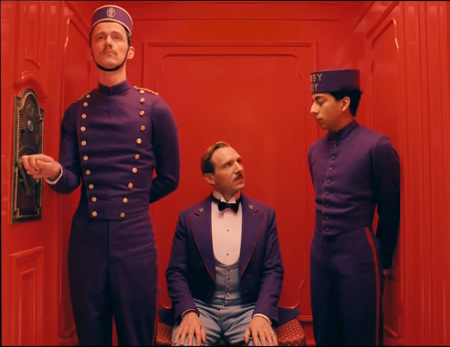
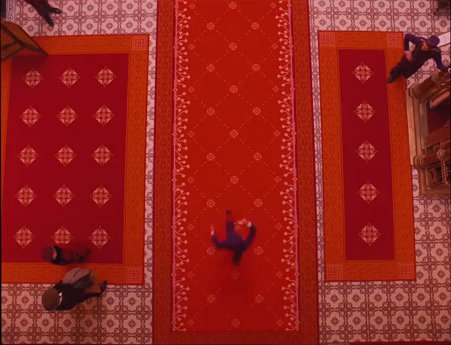
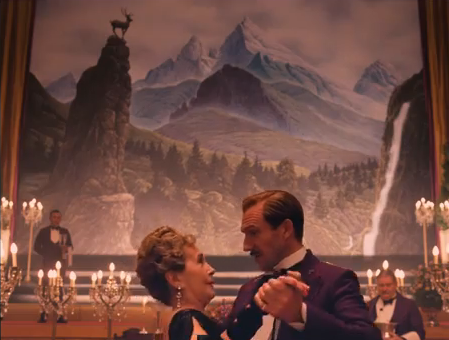
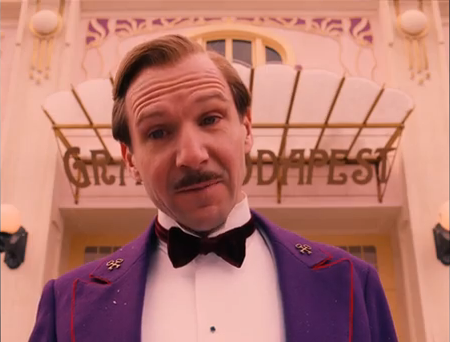
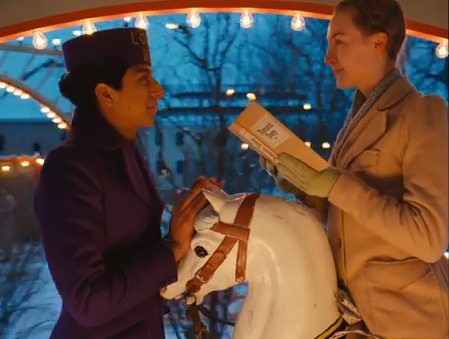
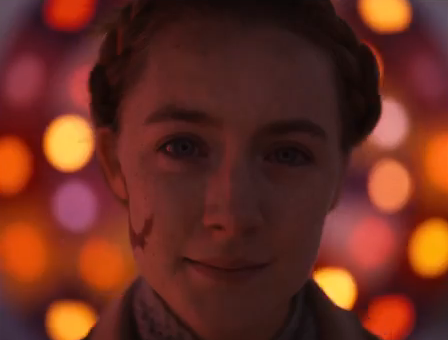
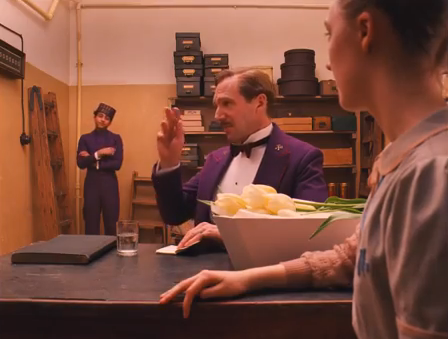
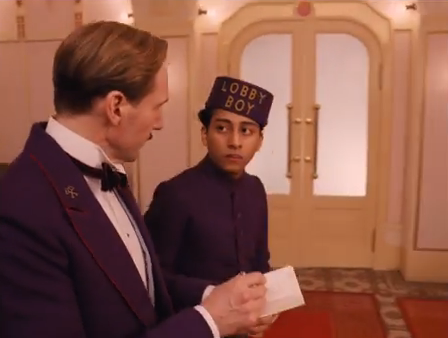
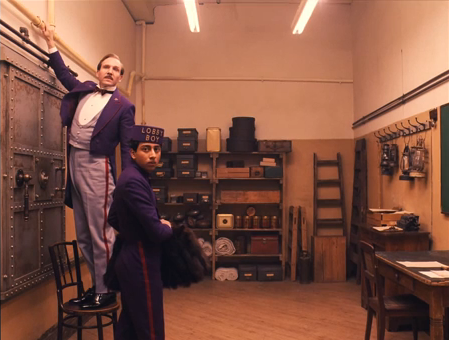
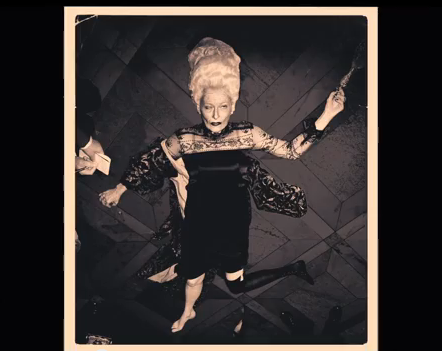
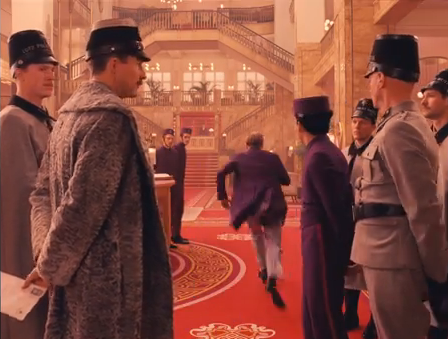
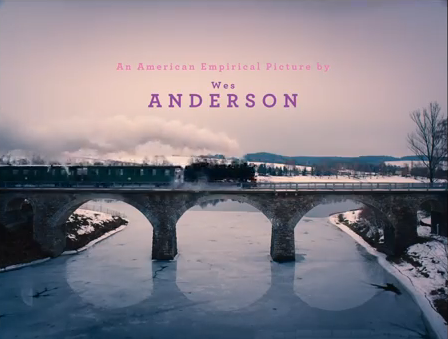
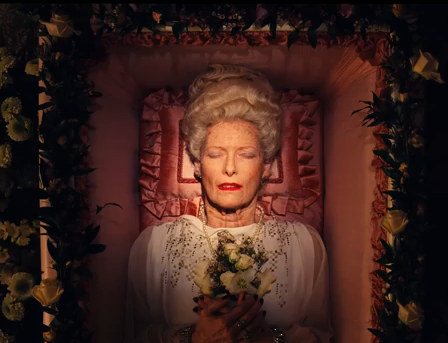
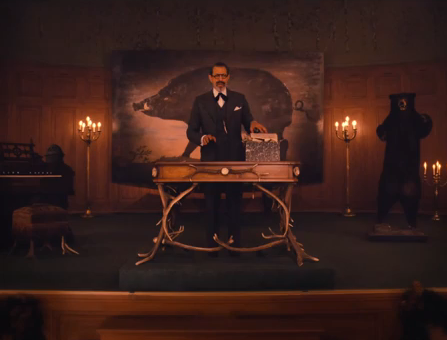
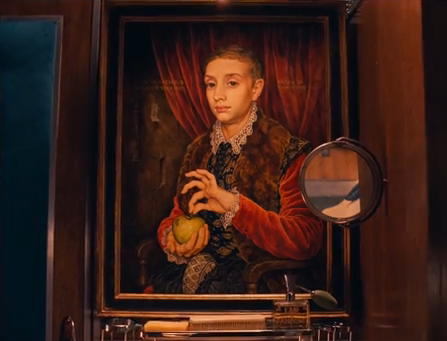
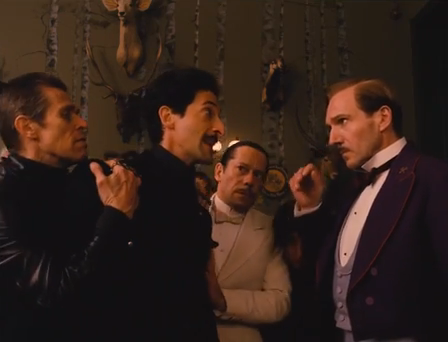
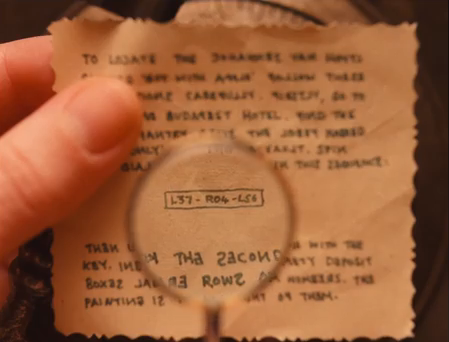
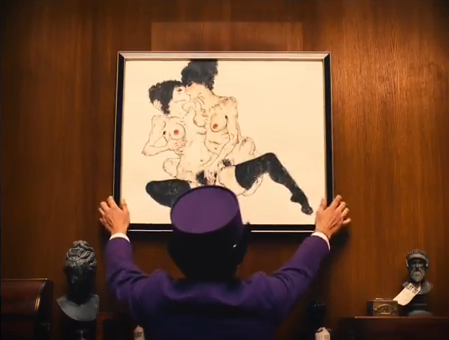
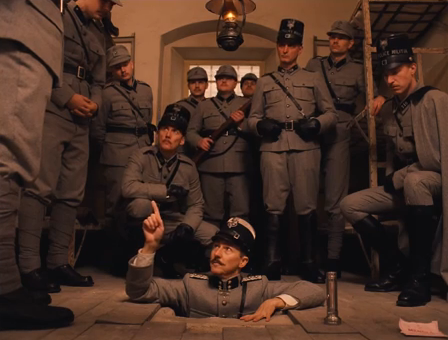
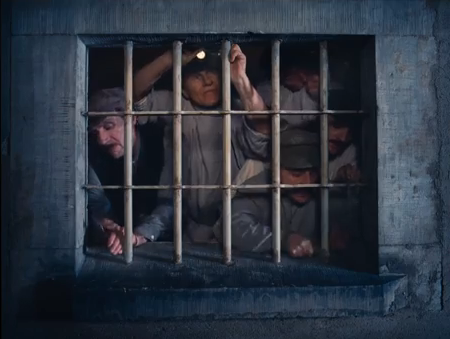
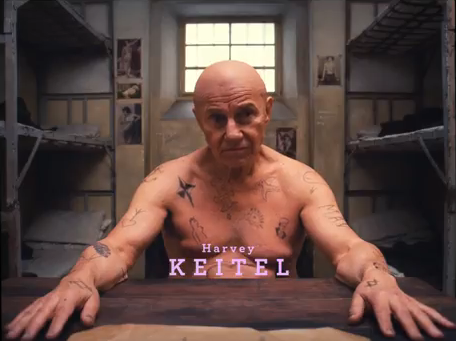
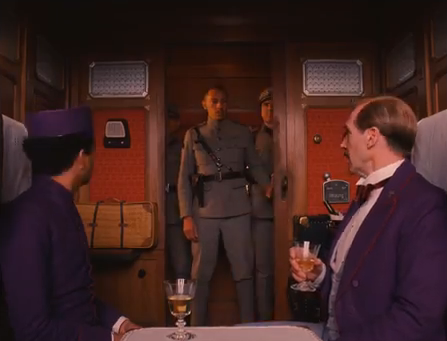
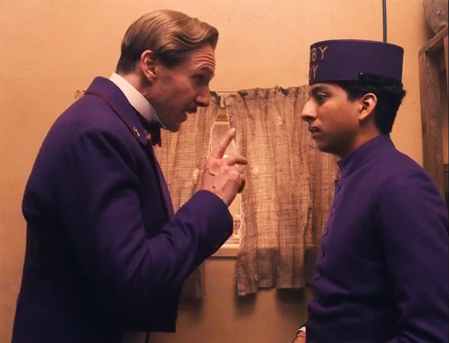
One thought on “Analyzing the Grand Budapest Hotel Trailer”
Comments are closed.